Bluebottle and other jellyfish
Bluebottles and other jellyfish live in all coastal waters.
Have I been stung?
If a bluebottle or other jellyfish stings you, it may cause:
- immediate intense pain
- redness at the sting site.
How to treat the sting
Wash the area with sea water, not fresh, to remove any tentacles.
Bluebottles
Soak the affected area in hot but not scalding water, ideally 45°C, for 20 minutes to help relieve the pain. Be careful with infants, the elderly or people who have poor skin condition, as hot water may burn the skin.
Other jellyfish
To treat other jellyfish stings:
- wash the sting site with sea water, not fresh water
- remove any tentacles by hand or wash them off with sea water.
You can also soak the affected area in hot but not scalding water, ideally 45°C, for 20 minutes to help relieve the pain. Be careful with infants, the elderly or people who have poor skin condition, as hot water may burn the skin.
Call us on 13 11 26 or see your doctor if you have severe pain that doesn't go away with painkillers.
Irukandji syndrome
A sting from jellyfish such as the Carukia barnesi can cause Irukandji syndrome which can be fatal. They live mainly in northern Australian waters.
Have I been stung?
Usually, the initial sting won’t cause you any pain or injury. However, during the following minutes or hours, you may develop Irukandji symptoms, including:
- severe pain
- restlessness
- sweating
- nausea
- vomiting.
How to treat the sting
Go to the nearest hospital for medical assessment.
Blue-ringed octopus
A blue-ringed octopus bite can be fatal. They live in beach rock pools and only show their blue markings if you disturb them.
Have I been bitten?
The blue-ringed octopus can bite you if you touch or stand on it. Their bite is often painless but if you’ve been bitten, you may:
- feel numb around your mouth, tongue, face and neck
- have a tight chest and difficulty breathing.
How to treat bites
Call Triple Zero (000), their bites can be fatal. What you do next depends on where the bite is.
Leg bites
Call Triple Zero (000) and apply a bandage and splint. Make sure the bandage is comfortable, as it will need to be worn until a doctor removes it. Apply the bandage even if the person is already ill from the poison.
Keep the person’s whole body still and don’t remove their clothing. Moving them may cause more venom to enter the blood stream.
Apply the bandage and splint
Apply a broad pressure bandage over the bite site as soon as you can. Crepe bandages are best, but you can use any flexible material. For example, clothing or towels.
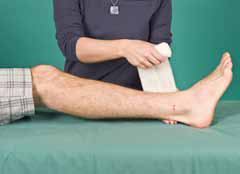
Bandage upwards from the lower part of the bitten leg. Wrap it firmly without stopping blood circulation. It should be as tight as you would apply to a sprained ankle.
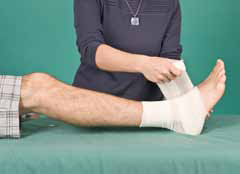
Wrap the bandage as high as possible up the leg.
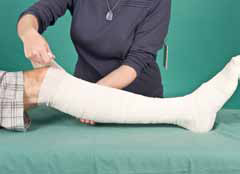
Apply a splint to the leg. You can use any stiff object as a splint, for example, a piece of wood or tree branch, or rolled up newspaper.
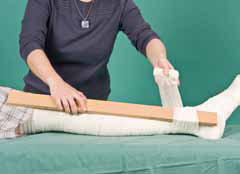
Bind it firmly to as much of the leg as possible.
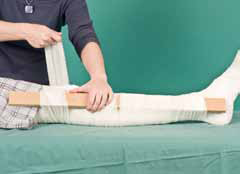
Lie them down to stop them from walking or moving around until the ambulance arrives.
Hand or forearm bites
Call Triple Zero (000) and apply a bandage and splint. Make sure the bandage is comfortable, as it will need to be worn until a doctor removes it. Apply the bandage even if the person is already ill from the poison.
Keep the person’s whole body still and don’t remove their clothing. Moving them may cause more venom to enter the blood stream.
- Bandage as much of their arm as possible, starting at the fingers.
- Apply a splint to their arm, any stiff object can be used as a splint, for example, a piece of wood or tree branch, or rolled up newspaper.
- Use a sling to stop the arm moving.
- Lie them down to stop them walking or moving around until the ambulance arrives.
Chest, abdomen, pelvis and back bites
Call Triple Zero (000) and apply firm pressure over the bitten area, if possible.
Don’t restrict chest movement and keep the person's whole body still until the ambulance arrives.
Head and neck bites
Call Triple Zero (000) and keep the person's whole body still until the ambulance arrives.
Don't apply any first aid to the bitten area.
Box jellyfish
Box jellyfish stings can be fatal. They live mostly in the warm waters north of the Tropic of Capricorn.
Have I been stung?
If a box jellyfish stings you, it may cause:
- severe pain in the area
- a noticeable rash – this can appear over 7 to 14 days
- unconsciousness
- fitting
- heart attack.
How to treat stings
Call Triple Zero (000). If the person collapses or stops breathing, start resuscitation (CPR). Find out about how to perform CPR on the Healthdirect website.
If you have a towel, you can try to remove the tentacles. Make sure you don't rub the skin.
Stonefish and other stinging fish
Stonefish stings can be fatal but there haven’t been any reported deaths in Australia. They live all along the coast and in some freshwaters.
Other stinging fish that can cause painful injuries include:
- butterfly cod
- scorpion cod
- cobbler
- catfish
- happy moments
- flathead.
Have I been stung?
If a fish stings you, it may cause:
- severe and persistent pain
- swelling in the area
- spine or barb in the skin.
How to treat stings
If the spine of a stonefish or other stinging fish goes into your skin, wash the wound site immediately. Soak the affected area in hot but not scalding water, about 45°C, for up to 90 minutes to help ease the pain. Be careful with infants, the elderly, or people who have poor skin condition, as hot water may burn the skin.
For severe pain or a deep wound go to the nearest hospital immediately.
Cone shell
Cone shell stings can be fatal and cause paralysis.
Have I been stung?
If a cone shell stings you, it may cause:
- pain, swelling and numbness at sting site
- prolonged weakness of muscles, including the respiratory muscles, making it hard to breathe
- disturbed vision, speech and hearing.
How to treat stings
Call Triple Zero (000), their stings can be fatal. What you do next depends on where the bite is.
Leg stings
Call Triple Zero (000) and apply a bandage and splint. Make sure the bandage is comfortable, as it will need to be worn until a doctor removes it. Apply the bandage even if the person is already ill from the poison.
Keep the person's whole body still and don’t remove their clothing. Moving them may cause more venom to enter the blood stream.
Apply the bandage and splint
Apply a broad pressure bandage over the bite site as soon as you can. Crepe bandages are best, but you can use any flexible material. For example, clothing or towels.

Bandage upwards from the lower part of the bitten leg. Wrap it firmly without stopping blood circulation. It should be as tight as you would apply to a sprained ankle.

Wrap the bandage as high as possible up the leg.

Apply a splint to the leg. You can use any stiff object as a splint, for example, a piece of wood or tree branch, or rolled up newspaper.

Bind it firmly to as much of the leg as possible.

Lie them down to stop them from walking or moving around until the ambulance arrives.
Hand or forearm stings
Call Triple Zero (000) and apply a bandage and splint. Make sure the bandage is comfortable, as it will need to be worn until a doctor removes it. Apply the bandage even if the person is already ill from the poison.
Keep the person’s whole body still and don’t remove their clothing. Moving them may cause more venom to enter the blood stream.
- Bandage as much of their arm as possible, starting at the fingers.
- Apply a splint to their arm, any stiff object can be used as a splint, for example, a piece of wood or tree branch, or rolled up newspaper.
- Use a sling to stop the arm moving.
- Lie them down to stop them walking or moving around until the ambulance arrives.
Chest, abdomen, pelvis and back stings
Call Triple Zero (000) and apply firm pressure over the bitten area, if possible.
Don’t restrict chest movement and keep the person's whole body still until the ambulance arrives.
Head and neck stings
Call Triple Zero (000) and keep the person's whole body still until the ambulance arrives.
Don't apply any first aid to the bitten area.
Prevent sea creature bites and stings
You can help prevent bites and stings by:
- checking signs for sea creature warnings
- researching warnings before you got to the beach
- supervising children around rock pools
- teaching children to never touch sea creatures.